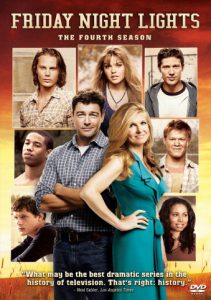Critics have often emphasized that “Friday Night Lights” isn’t just for football fans, because so much of the drama happens off the field. That’s completely true, but what’s not often mentioned is the flip-side of the equation: The on-field stuff is often unrealistic or melodramatic enough to turn off football fans.
In fact, I’m not convinced that “FNL” ever hooked football fans in the first place. I know many football fans, but many fewer “FNL” fans. I suspect the bulk of “FNL” fans is simply people who like good TV.
Let’s look at some of the reality-stretching plotlines:
- In Season 1, a gas leak forces a Panthers game to be moved to another site, so the team builds a football field. In a week.
- In Season 2, coach Taylor quits to take a college position. And then he changes his mind and is rehired mid-season.
- In Season 3, a game is canceled by the officials after the third quarter because a fight breaks out, and the win is awarded to Dillon, which is ahead at the time.
- At the end of Season 3, the district is split into two high schools, and we learn out of the blue that there is an old school sitting vacant on the east side of town. East Dillon had existed at some point in the past, and the building and football field just sat there unused in the meantime. They didn’t use it for a middle school or offices or anything like that.
- Season 4 begins with Dillon boosters having gerrymandered the districts in such a way that all of the good players go to their school and all the untested “Bad News Bears” types go to East Dillon. They’re allowed to get away with it because, apparently, all of the football fans live on the west side of town, too. Quite frankly, it’s such a remarkable achievement to stack your roster through gerrymandering that I think they should be allowed to get away with it. But then coach Taylor — now at East Dillon — takes away Dillon’s best running back when he discovers that he was using a fake address; the same fake address that had been instituted during Taylor’s tenure. But that makes no sense, because there was only one high school then!
- In the Lions’ first game of Season 4, coach Taylor forfeits at halftime because his team is too beat up.
- Also this season, the Dillon vs. East Dillon game is moved to Dillon’s field after Panther players tear up the Lions’ field with their trucks.
Some of these scenarios are barely conceivable and others are patently ridiculous. But my point is that the writers don’t seem to have any concept of how inherently dramatic a high school football season can be in real life, without resorting to this kind of melodrama.
The in-game stuff isn’t as absurd as the pregame stuff, but it too is presented sketchily. To wit:
- The on-field action doesn’t precisely look fake, but it is edited together in a “this is good enough” fashion, as if the editors just want to give you a flavor of the game, because the game isn’t the point.
- Along similar lines, we are often shown Coach Taylor on the sidelines, yelling things like “Come on!” and “What are you doing?!” But it rarely follows a specific play that gives context to his emotions.
- The writers have only focused on one defensive player, and his storyline was never completed because it was in the truncated Season 2. Also, the show never acknowledges that many high school players play both ways. The offense is always on the sideline while the defense is on the field. (But maybe there is more specialization in Texas than in smaller states, so I’ll give them a pass on this one.)
- In the Season 4 finale, which aired Friday on NBC, Landry kicks a game-winning 46-yard field goal. But we never see any indication that Landry is capable of doing that. Coach Taylor is always presented as a brilliant coach, but we never actually see brilliant play-calling. In the case of sending Landry out there in that situation, he just suddenly believes in his kicker, but we are shown no reason why he should.
(And, by the way, Landry uses a tee to kick the field goal. I know this isn’t allowed in the pros or college, and I didn’t think it was allowed in high school, but maybe I’m wrong. So I’ll give them a pass for now.)
The off-season drama of Season 4 is strong, but not without its flaws. I felt a sense of dread watching the Tim Riggins plotline. As soon as he gets in with his brother on that chop-shop operation, I knew without a doubt that it would end badly for him. So that kind of sucked the suspense out of the entire plotline and replaced it with a nervous sense of “When are the cops gonna show up?” And frankly, I felt like he deserved what was coming to him.
However, I must admit that Taylor Kitsch’s performance as Riggins has become iconic. The world keeps coming at Riggins — this season, he somehow gets caught in a mother-daughter love triangle even though he makes it clear to both of them that he is not interested — and he keeps fighting it off the best way he knows how. Hopefully Riggins will be out of prison in time for Season 5.
Other things I liked:
- I knew Tami Taylor would do the Classy Tami Taylor equivalent of telling school board officials to take this job and shove it after they demanded an apology for something she didn’t do. And I kind of enjoyed that, even though I knew it was coming.
- Without a doubt, the best episode of the season is when “FNL” gets as far away from football as it ever has: The death of the military father of Matt Saracen, who graduated last season and has nothing to do with football anymore. It’s highlighted by a wonderful performance by Zach Gilford, whose understated, mumbly approach to the former state-champion quarterback works perfectly here.
- Second place for best episode goes to the one where Vince goes along with his gang-member friends to execute a revenge killing for the killing of their friend. Vince does the right thing and backs out, and it’s genuinely edge-of-your-seat stuff when his friend points a gun in his face and Vince says “Do what you gotta do.”
I feel bad about writing a mostly negative review of “FNL,” which even at its worst is better than 90 percent of current shows. But it must be said: The football side of things has gotten short shrift from the beginning, and it’s not getting better.
(And you know another that bothers me? Season 2 doesn’t have an ending. Why are we supposed to care about the progress of the Lions or Panthers when no one in the entire town of Dillon mentions the result of the 2007 season? I guess we can assume they fail to defend their state title, but still, it’s just more evidence that “FNL” isn’t about football.)
For the final season, coming this fall to DirecTV and next summer to NBC, how about getting into the on-field drama a little more? I don’t care if the Lions win state or go winless, if it ends with split uprights or a “wide right.” I just want it to ring a little more true. If it does, “FNL” will go out as a champion. If not, I’ll remember it as a good show that didn’t live up to its full potential.


